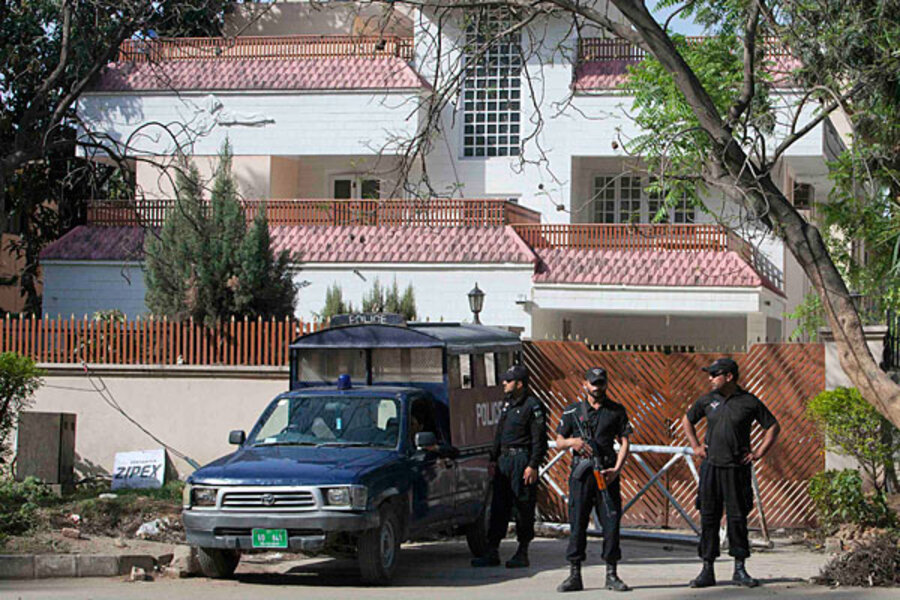Osama bin Laden widows: Will they reveal more about life in Pakistan?
Loading...
| Islamabad
A Pakistani court on Monday convicted Osama bin Laden's three widows and two of his daughters of illegally entering and living in the country and sentenced them to 45 days in prison, with credit for time served, their lawyer said.
The five women have been in detention since last May when US commandos killed the Al Qaeda chief at the walled three-story compound in the Pakistani town of Abbottabad where he had been living with his family for six years.
Pakistani authorities formally arrested the women on March 3, so they will serve another two weeks in prison and then will be deported to their home countries along with the family's younger children, said their lawyer, Mohammed Amir Khalil.
IN PICTURES:Osama bin Laden's terror legacy
The case treads on a number of sensitive issues for Pakistan. The army faced rare domestic criticism following the US raid that killed the al-Qaida chief because they were powerless to stop it. Citizens also said bin Laden's presence in the country for so long either pointed to the military's incompetence or complicity.
Two of the widows are Saudi and one is Yemeni, Khalil said. Khalil said Yemen has consented to the return, but he is still in discussions with Saudi officials. Saudi Arabia stripped bin Laden of his citizenship in 1994 because of his verbal attacks against the Saudi royal family.
The five women were also ordered to pay a fine of about $110 each, which has already been done, said Khalil. The lawyer does not plan to appeal the court's ruling.
Islamabad was outraged by the US raid that killed bin Laden because it was not told about it beforehand. Pakistani officials have said they had no idea the Al Qaeda chief was in Abbottabad, something many in Washington found hard to believe because his compound was located close to Pakistan's equivalent of West Point.
The US has not found any evidence indicating senior Pakistani officials knew of bin Laden's whereabouts.
But details uncovered recently from the interrogation of his 30-year-old Yemeni wife, Amal Ahmed Abdel-Fatah al-Sada, raised fresh questions about how bin Laden was able to remain undetected for so long in Pakistan after the Sept. 11, 2001 attacks, despite being the subject of a massive international manhunt.
After leaving Afghanistan, bin Laden lived in five safe houses over the course of nine years while on the run in Pakistan and fathered four children — two of them born in government hospitals, according to al-Sada's interrogation report, which was obtained by The Associated Press.
Al-Sada's account says she flew to Pakistan in 2000 and traveled to Afghanistan where she married bin Laden before the Sept. 11 attacks.
After that, the family "scattered" and she traveled to Karachi in Pakistan. She later met up with bin Laden in Peshawar and then moved to the Swat Valley, where they lived in two houses. They moved one more time before settling in Abbottabad in 2005.
The compound in Abbottabad was a crowded place, with 28 residents — including the 54-year-old bin Laden, his three wives, eight of his children and five of his grandchildren, according to Brig. Shaukat Qadir, a retired Pakistani army officer who spent months researching the bin Laden raid and said he was given access to interrogation transcripts.
The bin Laden children ranged in age from his son Khaled, who was in his 20s and was killed in the raid, to a 3-year-old born during their time in Abbottabad, said Qadir. Bin Laden's courier, the courier's brother and their wives and children also lived in the compound.
There was tension between bin Laden's youngest wife, al-Sada, and his oldest, Khairiah Saber, who arrived in Abbottabad in early 2011 after being held in Iran for about a decade, the brigadier said. Some in the family were convinced Saber intended to betray the al-Qaida leader.
There is no evidence Khairiah Saber had any role in bin Laden's end. U.S. officials have said his courier inadvertently led the CIA to the Abbottabad villa after they overheard him in a monitored phone call.





